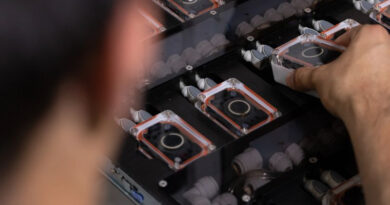Chinese Version Of Neuralink Introduced
Beijing Xinzhida Neurotechnology has developed a brain-computer interface (BCI) implant called Neucyber, which was tested on a monkey and allows it to control a robotic arm using only thoughts, state news agency Xinhua reported, adding that the technology was “independently developed” and became China’s first “highly effective invasive BCI”.
The Neucyber chip consists of flexible microelectrodes, “neural signal acquisition devices,” and a “generative neural decoding algorithm.” Unlike Neuralink, which has already conducted a series of tests on humans, Beijing Xinzhida Neurotechnology is still testing its implant on animals. “The neural interface detects subtle changes in the brain’s electrical signals, deciphers the brain’s intentions and implements ‘mental’ control, which makes it possible to control machines without physical contact,” explained Tsinghua University professor Luo Minmin.
Last year, a specialized laboratory for research into brain-machine interaction was opened in China, and the country’s government confirmed the priority of developing brain interface technologies. In February 2024, at Tsinghua University, a patient with paralysis of all limbs was implanted with another version of the neural interface – Neural Electronic Opportunity (NEO). This allowed the patient to drink water using a special robotic glove.
Although neither the scientists nor Xinhua mentioned Musk’s brain chip startup, the presentation of this new product at the annual Zhongguancun technology forum in Beijing underscores China’s desire to catch up with Neuralink.




